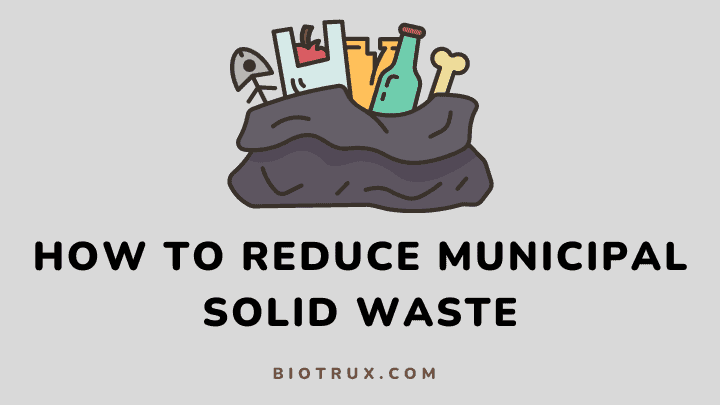If you’ve ever been concerned about the health of our planet, you may have pondered ways to reduce municipal solid waste. It’s a critical topic as we produce massive amounts of non-biodegradable waste daily.
But you don’t have to feel helpless in the face of this global issue — there are plenty of ways to make a difference. This article post will explain how you can reduce municipal solid waste and help protect the environment from further harm.
So, if reducing plastic use, composting, and recycling have been on your mind lately, let’s start. It’s time to get informed, active, and make positive changes today.
Understanding Municipal Solid Waste
Municipal solid waste (MSW), sometimes called garbage or trash, is non-hazardous solid waste generated by households and institutions such as schools, hospitals, restaurants, and businesses.
MSW generally consists of food scraps, plastics, paper, glass, metals, cardboard, textiles, batteries, electronics, appliances, yard clippings, etc. Different countries have different definitions of MSW.
However, the elements are all similar, consisting of products produced in everyday life that are no longer useful or wanted. It is important to understand what types of materials count as MSW, as this can help reduce the amount of waste going into landfills.
Generally, hazardous substances and recyclables are excluded from MSW as these should be disposed of separately. Recyclables should be taken to local recycling centers, while hazardous materials require special disposal due to their potential danger to people, animals, and the environment.
Knowing how to handle, store, and dispose of MSW properly can greatly reduce environmental impacts and keep our communities clean and healthy.
Strategies for Reducing Municipal Solid Waste
1. Reduce
Reducing municipal solid waste is a key strategy for combatting the growing global pollution problem. This can be done through intelligent consumption habits and the promotion of waste prevention.
Consumers should purchase high-quality goods meant to last, while businesses can explore options for product redesign and recycled packaging materials. By reducing the amount of waste generated, communities can help protect the planet for future generations.
Strategies for reducing consumption
To effectively reduce the quantity of Municipal Solid Waste (MSW) produced, it is important to focus on reducing consumption.
The measures include limiting or eliminating wasteful packaging, promoting reusable products, and encouraging eco-friendly practices in companies and households. These measures go beyond simply recycling and are critical for reducing the total waste generated.
In addition to reducing consumption, policymakers may also consider incentivizing manufacturers to make more sustainable products with fewer non-biodegradable materials.
This will help ensure that the reduction of MSW generation becomes a more permanent shift rather than a temporary adjustment.
2. Reuse
The reuse strategy involves finding new ways of using existing materials or objects. The approach reduces municipal solid waste (MSW) by allowing items to be reused and adding value without increasing volumes of MSW.
Reuse is beneficial in preventing the need for resource production and extraction, reducing impacts on land, air, and water quality.
Examples of reuse include repurposing materials, reclaiming building materials, using refillable containers, donating used clothing and books, mending broken items, and purchasing second-hand items.
Strategies for reuse
Reuse is one of the most effective strategies for reducing municipal solid waste. By donating used items in good condition, we can help extend the useful life of these materials and prevent them from ending up in landfills.
Also, when items are broken or worn out, it’s important to repair them instead of immediately replacing them. Furthermore, buying products with refillable containers rather than single-use items is a great way to reduce waste over time.
We can reduce the strain on our planet’s resources through reuse and ensure that valuable materials remain in circulation.
3. Recycle
Recycling is an important component of the strategy to reduce municipal solid waste. Recycling materials like plastic, glass, paper, and metal can prevent these items from ending in landfills. Instead, we can repurpose them into new products or uses.
Additionally, recycling helps to conserve energy and lower greenhouse gas emissions associated with creating new products from raw materials. This process also reduces reliance on non-renewable resources and creates jobs in the recycling industry.
Recycling may require extra effort, but it’s worth it for the sake of our environment and our future.
Strategies for recycling
Recycling is an important part of reducing municipal solid waste. An effective recycling program requires a combination of strategies, including educating citizens on the importance of recycling.
In addition, it requires partnering with private businesses to create opportunities for increased participation. Individual households should separate recyclables such as paper, metal, glass, and plastic containers into designated bins to maximize their impact.
Additionally, businesses such as grocery stores and restaurants can benefit from using reusable or biodegradable containers to reduce waste. Municipalities can help reduce the amount of solid waste generated in their communities by implementing comprehensive recycling programs.
4. Compost
Composting is one of the most effective ways to reduce municipal solid waste. It is a biological decomposition process that breaks down organic material into nutrient-rich compost that can be used as fertilizer.
Composting reduces the amount of solid waste that ends up in landfills. It also creates an efficient and cost-effective fertilizer to improve soil fertility and structure.
Composting, therefore, provides a sustainable solution that can benefit both the environment and local communities.
Strategies for composting
Reducing municipal solid waste is important in creating a more sustainable world. One way to do so is through the implementation of composting programs.
Composting transforms organic material into soil-enriching material, which can then enrich gardens, fields, and other areas. Composting is beneficial because it reduces the amount of organic material that goes into landfills and helps to improve soil quality.
To effectively reduce municipal solid waste, citizens must be educated about the advantages of composting.
Businesses can also promote composting by participating in initiatives such as providing compost bins for their employees. They can also set up collection points for residents and offer composting workshops.
By prioritizing composting, communities can minimize their contribution to landfill waste and work together to create healthier ecosystems.
Implementing Municipal Solid Waste Reduction Strategies

1. Governmental policies
Governments are uniquely positioned to create policies promoting sustainable waste management. At the municipal level, this could include regulations such as enforcing recycling laws, banning certain single-use plastics, and encouraging composting.
Governments can also reduce the amount of waste generated by incentivizing producers to reduce packaging materials. Additionally, local governments can create public education campaigns to raise awareness about responsible waste disposal and reduction practices.
Accordingly, governments regulate and incentivize sustainable waste management solutions to protect our environment and conserve resources.
2. Community programs
Reducing waste from municipal solid waste systems requires preventative strategies proven to work. One such strategy is the implementation of community programs.
These programs can educate communities about the importance of waste reduction and provide incentives for individuals and businesses to manage their waste properly. Such programs may include waste exchange events, recyclable drop-off centers, composting initiatives, and energy efficiency and reuse workshops.
By maintaining strong participation in these programs, communities can effectively reduce the waste disposed of in landfills and incinerators.
3. Personal action
One of the most effective ways to reduce municipal solid waste is to take action on a personal level. We can improve our environment by reducing single-use plastics, composting kitchen waste, and buying products with minimal packaging.
Encouraging others in your community to participate in waste reduction initiatives is also beneficial. Raising awareness about disposal techniques for hazardous materials and recycling programs can also help reduce waste.
Educating yourself and sharing this information with others is an important way to reduce municipal solid waste.
FAQs
What are some easy ways to reduce municipal solid waste at home?
There are several easy ways to reduce municipal solid waste at home. These include reusable shopping bags, water bottles, and containers, composting food scraps, and recycling materials like paper, plastic, and glass.
What are some strategies for reducing municipal solid waste at the source?
Strategies for reducing municipal solid waste at the source include reducing consumption, reusing items instead of buying new ones, repairing items when possible, and refilling containers rather than buying single-use products.
Can waste-to-energy technologies help reduce municipal solid waste?
Waste-to-energy technologies can convert MSW into energy, but they are not a complete solution for reducing MSW. They can help to reduce the volume of waste going to landfills, but it’s important to prioritize source reduction, reuse, recycling, and composting.
Final Thoughts
Reducing municipal solid waste is possible – and it begins with encouraging a conscious consumption lifestyle. By recognizing the power of individual consumption habits, we can all make a difference in preserving our planet.
We must seek to reduce, reuse and recycle wherever possible, not for ourselves but as an investment for future generations. Let’s choose to be environmentally responsible and strive to create a better tomorrow.
With a collective effort, there’s no telling what we can do to reduce municipal solid waste. We owe it to ourselves and future generations to pick up the torch of stewardship and ensure we significantly reduce our dependence on single-use plastics and disposable items.
Let us all work to reduce our environmental impact – for everyone’s sake. You can also learn more about what will happen without recycling.
Thanks for reading.

